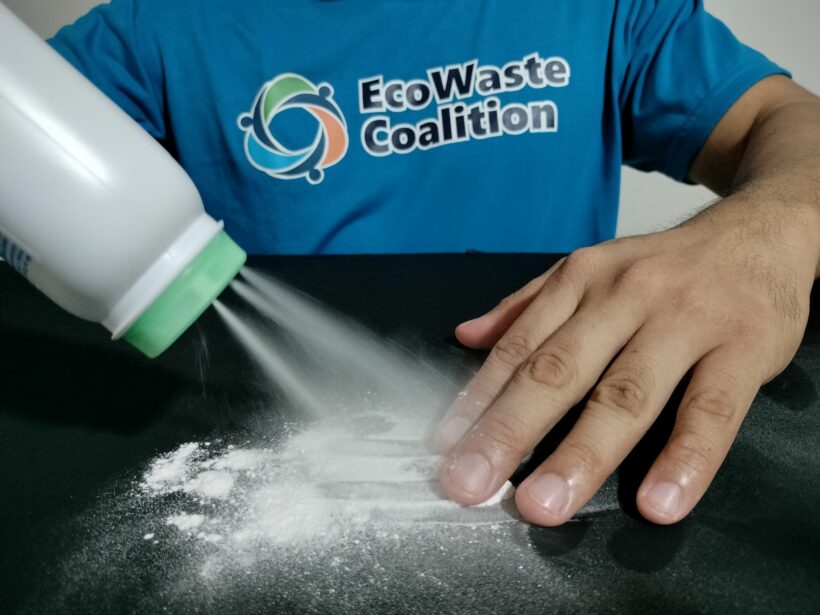19 August 2022, Quezon City. Non-government organizations welcomed the decision of a US transnational corporation to phase out by 2023 its talc-based baby powder from the global market, including the Philippines.
As it announced last August 11, Johnson & Johnson would end international sales of its iconic talc-based baby powder and transition to cornstarch-based product, a move that was welcomed by the EcoWaste Coalition, Associated Labor Unions-TUCP and Arugaan.
“We welcome J&J’s decision, albeit rather delayed, to terminate worldwide sales of its talc-based powder, which is alleged to contain asbestos fibers blamed for life-threatening health problems, including mesothelioma and ovarian cancer,” said Aileen Lucero, National Coordinator, EcoWaste Coalition.
“Other baby powder manufacturers should follow suit and replace talc with alternatives that will not pose asbestos-related risk. Shifting to non-talc production will not only protect consumers but also workers and miners, from toxic exposure to asbestos-contaminated talc and products,” said Gerard R. Seno, National Executive Vice President, ALU-TUCP.
“As talc-based baby powder products are still on store shelves, we advise consumers to read labels carefully and choose products without talc. Makers of non-talc products should get their goods independently certified and labeled as asbestos-free to assist consumers in making an informed choice,” said Ines Fernandez, Executive Director, Arugaan. “We don’t want asbestos exposure for ourselves and most especially for our babies.”
Responding to a campaign call by the International Pollutants Elimination Network (IPEN), the EcoWaste Coalition, ALU-TUCP and Arugaan wrote to J&J-Philippines on June 8, 2020, urging the company to remove its talc-based baby powder from store shelves following their permanent withdrawal in the USA and Canada amid a barrage of legal suits alleging asbestos contamination of the said product.
“We find it unacceptable that similar Johnson’s products at the center of the litigation proceedings are still sold in the Philippines and other countries while their sale has been discontinued in Canada and the USA. This, in our perspective, is a double standard,” the groups wrote.
“The right to health and to be free from dangerous and harmful chemicals, especially of children, is of paramount importance,” the groups emphasized.
Responding to their letter, J&J-Philippines wrote back on June 9, 2020, stating it “remains steadfastly confident in the safety of talc-based Johnson’s Baby Powder.”
In a related statement, Sugio Furuya, Coordinator of the Asian Ban Asbestos Network (ABAN) said “while ABAN is relieved that J&J has finally done the right thing, there can be no doubt that its delay in acting will result in many more cancer cases – cases which could have been avoided had this toxic product been withdrawn simultaneously in all markets.”
“The company has an obligation to disclose all its data on sales of its talc-based baby powder in Asia and other regions,” he said.
Reference:










